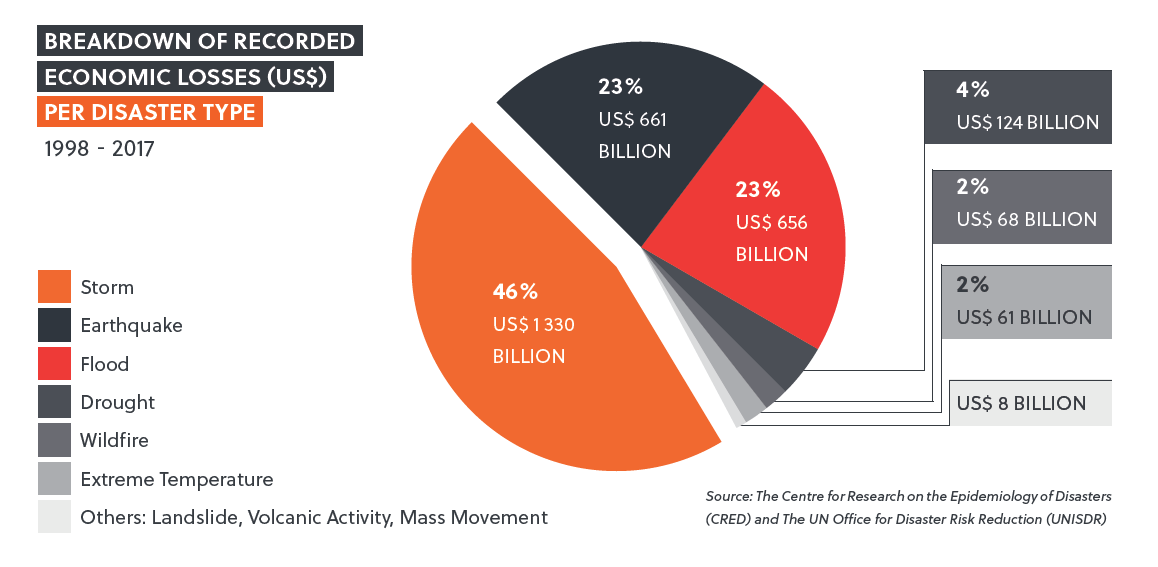Underprepared and Overpoliticised: Government Responses to Natural Disasters
At a state-level, challenges such as urban migration, population growth and food security demands have increased the vulnerability of states to natural disasters and introduced new complexities in preparing for them. Yet, these response plans have become the latest avenue for political posturing between interest groups, often resulting in an underprepared and overpoliticised response. This posturing has reduced community resilience to natural hazards and pending natural disasters, while leaving commercial players increasingly reliant on private responders. With little consensus on the international front, the absence of global guidance in preparing and responding to climate challenges and the presence of dominant domestic agendas, states will be isolated and likely inconsistent in their approaches to natural disasters in 2019

Indonesia - Earthquakes & Tsunamis
Indonesia is prone to a variety of natural hazards, including earthquakes and tsunamis. In September 2018, an earthquake measuring 7.5 on the Richter scale struck off the coast of Sulawesi, one of Indonesia’s main islands. The quake prompted a six-metre-high tsunami which hit the city of Palu, Central Sulawesi, resulting in the deaths of some 2,100 people. In addition to these deaths, over 206,500 people became refugees as a result of the combined effects of the earthquake and tsunami. Opposition groups criticised President Joko Widodo, more commonly known as Jokowi, over the government’s alleged failure to repair Indonesia’s tsunami warning system, which had been inoperable since 2012. Given that Indonesia is scheduled to hold elections in April 2019, it is likely that opposition groups will continue to politicise disaster management in the coming months.
US - Wildfires
Throughout 2018, more than 8,400 wildfires killed at least 106 people, including six firefighters, in the state of California. The fires destroyed commercial and residential buildings resulting in USD 3.5 billion in property damage. Californian wildfires have increased in frequency and intensity, and have had a greater impact on human activity, in recent years. This is reportedly due to a combination of climate change, a five-year long drought, and population expansion into wildfire high-risk areas. Following the most recent wildfires, accusations were levelled at both the Californian and US federal governments regarding their alleged failure to effectively prepare for the disaster. Officials from both the state and federal government’s accused each other of being underprepared. The Trump administration accused the state government of environmental mismanagement, while the latter accused the federal government of politicising the issue.
El Salvador
Recent droughts across Latin America have caused severe disruptions to the agricultural sector. Such droughts have been particularly acute in several Central American counties, including El Salvador. In 2018, drought conditions in Central American’s “dry corridor”, which spans El Salvador and Honduras, impacted over 2 million people and severely undermined the region’s agricultural sector. In July 2018, El Salvador’s government issued emergency measures for the 143 municipalities impacted by drought. The measures included humanitarian relief and the provision of seeds for farmers. Central America’s droughts are also one of the contributing factors behind the 2018 exodus of thousands of migrants, attempting to reach the US. As such, the region’s droughts have implications for local, and regional politics, due to public opposition to migrant caravans in counties such as Mexico and the US.
Saudi Arabia - Flooding
Over the past 10 years, flooding has been the most common natural hazard in Saudi Arabia. In 2009, 2011, 2017 and 2018, flash floods caused infrastructural damages worth USD 550 million and resulted in the loss of at least 150 lives. The most destructive flooding over this period occurred in Jeddah, the country's second largest city and a major commercial hub. This prompted Saudi critics to accuse the government of corruption and mismanagement in city planning, construction, and the awarding of contracts, leading to improper infrastructure building. Some attempts have been made to hold corrupt officials accountable; however, these have been criticised for being motivated by elite power struggles rather than concerns over widespread corruption. As there is little indication that ongoing anti-corruption initiatives will be comprehensive and improve the country's ability to deal with floods, effective government preparation and adequate response to natural disasters remain highly unlikely in the short to medium term.
Nigeria - Flooding
Heavy seasonal rains and subsequent flooding have led to severe infrastructural damage in Nigeria which, according to the Nigerian Meteorological Agency, has increased in intensity in recent years. As of 27 September 2018, flooding caused the displacement of more than 800,000 people across 12 different states in southern and central Nigeria, including in larger urban hubs, such as Lagos. Between August and September 2018, at least 242 people died amid widespread flooding. Flooding has been exacerbated by insufficient and poorly constructed urban drainage systems, residential construction projects in high-risk areas, the widespread practice of dumping rubbish in flood drainage systems, which causes blockages, and deforestation, which prevents excess water from being consumed by trees. In the absence of clear government reforms to address these underlying issues, the situation will likely worsen in 2019. As Nigeria enters an election year in 2019 and local politicians will be campaigning on issues such as corruption and security, addressing these environmental challenges will remain a low priority.
